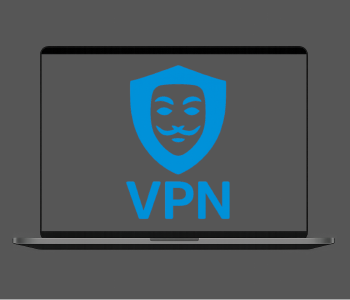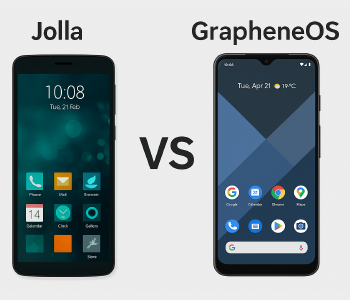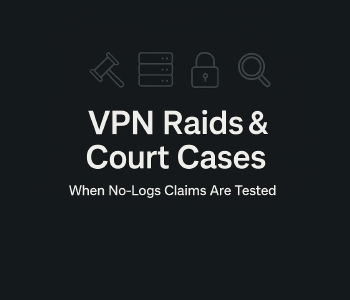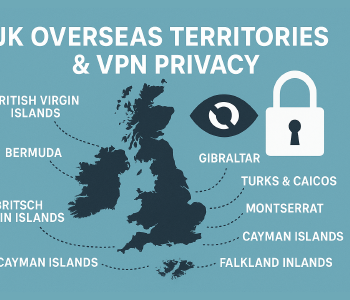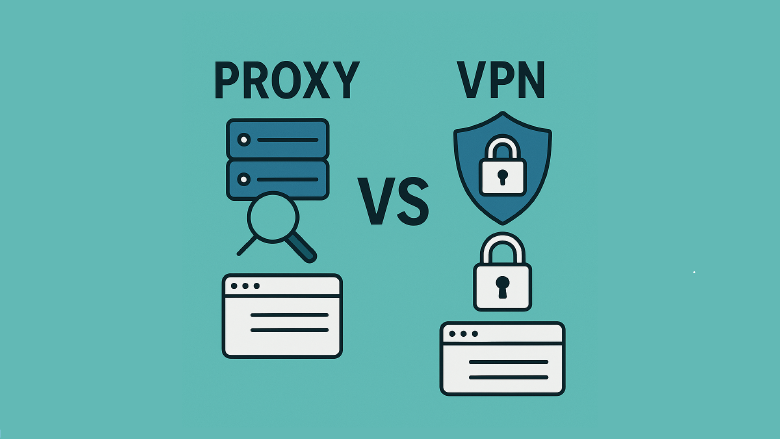
VPN vs. Proxy: Which One Actually Protects Your Privacy?
Let’s clear something up: proxies and VPNs aren’t the same thing — even though people often use them interchangeably. Both can hide your IP address. But only one is built for serious privacy.
So when should you use a proxy? When does a VPN make more sense? And can you trust either one not to spy on you?
Here’s the breakdown.
What’s the Real Difference Between a VPN and a Proxy?
Think of proxies as the bare-bones version of online privacy. They route your traffic through another server, which hides your IP — but that’s about it.
- Proxies usually work per app or per browser tab, not for your entire device.
- They don’t encrypt your traffic.
- If you open another app (or even another tab), your real IP might still leak.
That’s fine if you’re just unblocking a website. But not great for anything sensitive.
A VPN, on the other hand:
- Routes all traffic from your device through a secure server
- Encrypts everything, even DNS requests
- Protects every app and tab, not just your browser
As Laurent Fasnacht from Proton VPN puts it: “With a VPN, it’s a tunnel that stays in place. All your traffic goes through it — not just one app.”
So if you’re worried about advertisers, trackers, ISPs, or even data brokers watching what you do? A VPN is the tool that actually keeps them out.
Use Cases: When to Use a Proxy vs. a VPN
There are times when a simple proxy gets the job done:
- You just want to unblock a website
- You need to change your IP for light testing or scraping
- You’re managing multiple social accounts and need IP rotation
But for most people, proxies are overkill — or not secure enough.
Use a VPN if you:
- Want to encrypt your traffic (especially on public Wi-Fi)
- Need to stream geo-blocked content without buffering
- Care about privacy from advertisers, your ISP, or data brokers
- Want a set-it-and-forget-it solution across your whole device
VPNs do cost a bit more — but many have free tiers or affordable plans (Proton VPN’s free version is a great start).
Web Scraping: VPNs vs. Proxies
If you’re scraping data from websites — maybe for SEO research, market tracking, or competitor analysis — the tool you choose matters.
Using a Proxy for Web Scraping
✅ Pros:
- You can rotate between hundreds or thousands of IPs
- Many proxy providers offer residential or mobile IP pools that look more “natural” to websites
- Lower risk of IP bans if you’re scraping at scale
🚫 Cons:
- Free proxies are often blocked or blacklisted
- Residential proxies can be expensive and sometimes come with unclear data practices
- No encryption — your ISP (or a snoop) can see everything
Using a VPN for Web Scraping
✅ Pros:
- Encrypted connection — your traffic is private from ISPs
- Useful if you need manual scraping or light automation from a few locations
- Great for smaller jobs or low-volume scraping with tools like curl or browser automation
🚫 Cons:
- Most VPNs offer fewer IPs (a few dozen or hundred at most)
- Heavy scraping from a VPN IP will likely get blocked fast
- No built-in rotation, unless you manage it manually
👉 Verdict:
- If you’re scraping at scale or need lots of rotation? Go with a proxy.
- If you’re scraping light data and want encryption and privacy? A VPN might be enough — especially if you’re combining it with browser automation or need a clean IP in a specific region.
Are VPNs and Proxies Safe to Use Together?
Not really.
Stacking a VPN on top of a proxy (or vice versa) won’t give you double the privacy. It just slows everything down — and increases the chance of something breaking.
Pick one. If you’re choosing based on security and peace of mind? Go with a VPN.
Which Is More Private?
Let’s talk trust.
VPNs and proxy services can log your data. That includes your IP, browsing history, or how long you stayed connected. That’s why it’s critical to read their privacy policies and dig into how the company actually makes money.
Remember: if it’s free and vague about tracking — you’re probably the product.
Many proxy services especially fall into this trap. Some ask you to share your bandwidth and become part of their proxy network. That means someone else could be using your IP — and you’re on the hook if they do something shady.
With VPNs, look for:
- Independently audited no-logs policies
- Clear ownership (not shell companies or ad firms)
- Optional features like kill switches, ad blocking, or RAM-only servers
Proton VPN, Mullvad, and TunnelBear are a few names that have passed real-world audits and are upfront about what they do (and don’t) collect.
Final Thought: Don’t Just Hide Your IP — Protect It
Both proxies and VPNs can make it look like you’re somewhere else. But only VPNs offer full-device encryption, leak protection, and a real shot at online privacy.
If you’re just bypassing a basic block? A proxy works.
If you’re scraping websites from multiple countries at scale? A proxy pool is probably the way to go.
But if you’re serious about keeping your data safe from ISPs, advertisers, trackers, or data brokers — a VPN is the tool that actually holds up.
Ready to pick one?
👉 Check out our latest VPN reviews — tested, transparent, and built for privacy.



